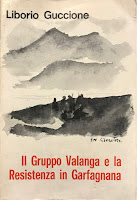Nella quinta tappa riscopriamo Liborio Guccione. Nasce ad Alia nel 1922, nel 1947 si trasferisce in Toscana dove svolge l'attività di giornalista e scrittore ma sin dal 1944 si dedica all'organizzazione dei contadini e alla loro protesta nell'occupazione delle terre fino a divenire segretario provinciale della Federterra. Muore nel marzo 1996 facendo appena in tempo a consegnare il romanzo "Giorni vissuti come fossero anni" all'amministrazione comunale di Alia grazie alla quale il lavoro viene pubblicato assumendo un valore importante e significativo.
In the fifth stage we rediscover Liborio Guccione. He was born in Alia in 1922, in 1947 he moved to Tuscany where he worked as a journalist and writer but since 1944 he dedicated himself to the organization of the peasants and their protest in the occupation of land to become the provincial secretary of the Federterra. He dies in March 1996 just in time to deliver the novel "Days lived as if they were years" to the municipal administration of Alia thanks to which the work is published assuming an important and significant value.
In writing this work the Alian Guccione has collected his memories, the reminiscences of the few years lived as a child in "Lalia" the native country. He relives those events from a point of view and a time now foreign, evokes men, environments, customs, traditions and many other peculiarities of the peasant community stimulating the memory of old and new generations. It recovers an inestimable heritage of oral sources that cannot be found in the archives and municipal libraries. Therefore, the novel assumes an important civil, cultural and human role at a time when the values of tradition and peasant civilization seem to be disappearing. Therefore, the message is to establish a bond between the new generations and the best part of the past in order to create a thread that binds everyone in time, space and traditions.
Other works are the historical novels "Black Fridays", "Cu vinciu?Chi vinse?" and essays on the Resistance "Gruppo Valanga and the Resistance in Garfagnana", "Missione Rosa-Balilla Resistance and the Allies".






Nessun commento:
Posta un commento